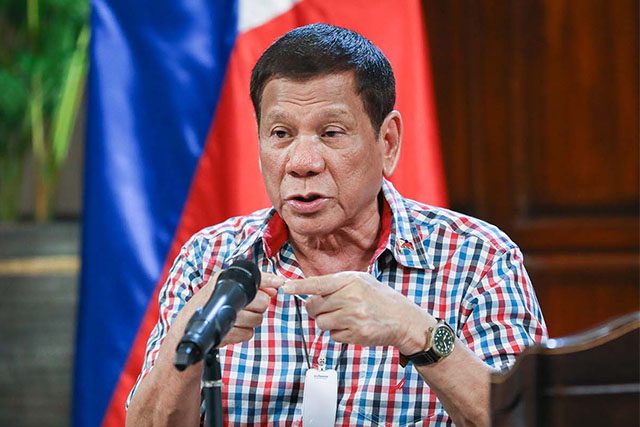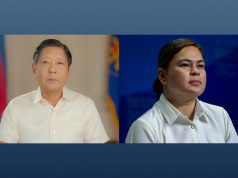
President Rodrigo Duterte in his latest national address, aired Thursday evening, asked Filipinos of their contributions concerning the novel coronavirus pandemic despite being granted emergency powers and being mandated by the Philippine Constitution to serve people.
The chief executive hit back at the critics of his administration and likened them to “snakes” particularly cobra, which are allegedly doing nothing but open their mouth.
“Ito lang tanong ko: Dumaan na man kayo, ano ang nagawa ninyo para sa bayan? Iyan lang. Kapag sinabi ninyo ako wala, okay wala. Eh kayo? What have you done for the country except
to talk and criticize and talk?” Duterte said in his address.
“Sa Mindanao maraming ahas, pero hindi ko alam na karamihan cobra lumipat na dito… Kita mo nagdadaldal. ’Yan, mga kobra. Walang ginawa kundi maghintay, magkagat, just to be able to open his or her mouth, para sabihin alam lahat,” he added.
Duterte also mentioned that he would “identify” his critics whom he claimed were just politicking and “posturing.”
“But for the sake of the country, I will identify ‘yung mga Pilipino na walang ginawa kung hindi magbatikos, maghanap ng mali para lang may masabi at marinig sila ng mga tao,” he said.
Filipinos’ contributions
Duterte’s remarks were countered by some Filipinos who pointed out that they have contributed to the nation by paying taxes, giving donations to fundraising drives for the vulnerable sectors hit by the enhanced community quarantine and holding the president accountable as a public official, among others.
“Nagbabayad po kami ng VAT (value-added tax) para magkalaman ang kaban ng bayan. Hindi po ba valid na dahilan ‘yun para magkaroon kami ng karapatan na mag-criticize?” a parody Twitter account said.
“Hindi dahil ikaw si Duterte, but because we think you can and should do better,” it added.
The Department of Budget Management said that the national budget is financed from the following fund sources: 1) revenues
from both tax and non-tax sources; 2) borrowings from both domestic and foreign sources; and, 3) withdrawals from available cash balances.
Taxes can be collected through a citizen’s income, through goods and services on the market and through tariffs and duties.
Blogger and newspaper columnist Tonyo Cruz simply posted a graphic with the P275 billion as text, referring to the budget that was granted to Duterte for his anti-COVID-19 efforts.
Duterte at DDS: Anong ambag mo?
Sagot ng bayan: pic.twitter.com/xEtGKAFAj8
— Tonyo Cruz (@tonyocruz) April 16, 2020
Under the Bayanihan to Heal as One Act or Republic Act 11469, the 18th Congress allocated P275 billion of funds which would be used to aid Filipinos affected by the enhanced community quarantine and to bolster the nation’s healthcare system.
Meanwhile, other Filipinos have been giving donations for fundraising drives to support different sectors affected by the enhanced community quarantine as a result of the pandemic.
These include local celebrities who have been using their influence to give out food packages to daily wage earners and low-income families, as well as monetary donations to be used for purchase of medical supplies such as personal protective equipment suits and surgical masks.
Ordinary Filipinos are also using their skills to support their respective communities affected by the quarantine in their own ways. Some are selling their artworks to raise funds and support frontliners while others are baking snacks for their sustenance, among others.
There are also Filipinos who are maximizing their connections to support communities like a Hong Kong-based journalist who is helping her mother in the Philippines on provincial relief efforts.
Internet-savvy citizens are also harnessing the power of technology in the form of Facebook groups to help low-income families by donating cash to daily wage earners affected by the suspension of onsite work operations.

Other Filipinos have also been keen on holding the government accountable when it comes to addressing issues on COVID-19, since their means of involvement in national affairs is a must under a democratic society.
Among the issues that have been addressed with the help of public uproar include calls for mass testing, raising the allowances of health volunteers and urging the National Bureau of Investigation to probe Sen. Koko Pimentel after violating quarantine protocols, among others.
In response to Duterte’s latest speech, a Filipino remarked, “Constructive criticism ang paggamit ng mga constituents niyo sa pag-criticize tapos sasabihin ka ni Duterte na ‘ano ambag niyo?’ Tss Duterte, trabaho mo maglingkod sa bansa at ikaw ang naiboto diyan,” he tweeted.
Filipinos under the 1987 Philippine Constitution are granted the freedom of speech and expression, as well as the right to “petition the government for redress of grievances.”
What is the president’s mandate?
The president is the head of the state constitutionally mandated “to serve and protect the people,” being elected by the Filipinos themselves.
He is expected to oversee the “maintenance of peace and order, the protection of life, liberty and property, and the promotion of the general welfare” of the nation.
Jesuit priest and noted constitutionalist Joaquin Bernas wrote in a 2014 newspaper column that the president is also expected to protect the Constitution which is the fundamental law of the nation.
He quoted the Supreme Court which noted that the chief executive has “unstated residual powers” that include the government serving and protecting its constituents at all costs under his leadership.
Before a president officially takes office, he takes an oath before the Philippine flag wherein he pledges his subservience to the nation and its citizens. The oath states:
“I do solemnly swear (or affirm) that I will faithfully and conscientiously fulfill my duties as President (or Vice-President or Acting President) of the Philippines, preserve and defend its Constitution, execute its laws, do justice to every man, and consecrate myself to the service of the Nation. So help me God.”









